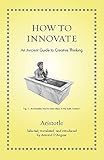How to Innovate : An Ancient Guide to Creative Thinking / Aristotle.
Material type: TextSeries: Ancient Wisdom for Modern ReadersPublisher: Princeton, NJ : Princeton University Press, [2021]Copyright date: ©2021Description: 1 online resource (168 p.)Content type:
TextSeries: Ancient Wisdom for Modern ReadersPublisher: Princeton, NJ : Princeton University Press, [2021]Copyright date: ©2021Description: 1 online resource (168 p.)Content type: - 9780691223599
- Technological innovations -- Greece -- Early works to 1800
- PHILOSOPHY / History & Surveys / Ancient & Classical
- Anaximander
- Anaximenes
- Aristotle
- Artillery
- Ballista
- Battle of Leuctra
- Battlement
- Buddhism
- Buddhist texts
- Buoyancy
- Capture of Grenada (1779)
- Cavalry
- Clothing
- Common ownership
- Communal land
- Consideration
- Constitution
- Creativity
- Criticism
- Cultivator
- De rerum natura
- Democracy
- Democritus
- Diodorus Siculus
- Disadvantage
- Dividend
- Dough
- Drinking
- Empedocles
- Epaminondas
- Ephesus
- Ephor
- Epicurus
- Eureka effect
- Finance
- First principle
- Ford Model T
- Fortification
- Governing (magazine)
- Government
- Greek alphabet
- Greek mythology
- Hippodamus of Miletus
- Household
- Ingenuity
- Institution
- Investor
- Leather
- Legislation
- Leuctra
- Long hair
- Lucretius
- Main course
- Manchu language
- Mast (sailing)
- Mathematical proof
- Meal
- Modern physics
- Natural philosophy
- Ningxia
- North Africa
- Of Education
- Oligarchy
- Ownership
- Panchen Lama
- Parmenides (dialogue)
- Pasture
- Phenomenon
- Philosopher
- Philosophy
- Phrase
- Physics (Aristotle)
- Pleasure
- Politics
- Principle
- Projectile
- Prow
- Qianlong Emperor
- Quantity
- Renaissance
- Rhetoric
- Ruler
- Self-control
- Sharing
- Siege engine
- Syracusia
- Tariff
- Thales
- The First Man
- The Interpretation of Dreams
- Thebes, Greece
- Theory
- Thought
- Travel
- Vitruvius
- Water tank
- Wealth
- Weapon
- Writing
- Zeuxis
- online - DeGruyter
| Item type | Current library | Call number | URL | Status | Notes | Barcode | |
|---|---|---|---|---|---|---|---|
 eBook
eBook
|
Biblioteca "Angelicum" Pont. Univ. S.Tommaso d'Aquino Nuvola online | online - DeGruyter (Browse shelf(Opens below)) | Online access | Not for loan (Accesso limitato) | Accesso per gli utenti autorizzati / Access for authorized users | (dgr)9780691223599 |
Browsing Biblioteca "Angelicum" Pont. Univ. S.Tommaso d'Aquino shelves, Shelving location: Nuvola online Close shelf browser (Hides shelf browser)

|

|

|

|

|

|

|
||
| online - DeGruyter Raiding the Land of the Foreigners : The Limits of the Nation on an Indonesian Frontier / | online - DeGruyter The Politics of Market Reform in Fragile Democracies : Argentina, Brazil, Peru, and Venezuela / | online - DeGruyter Managing Medical Authority : How Doctors Compete for Status and Create Knowledge / | online - DeGruyter How to Innovate : An Ancient Guide to Creative Thinking / | online - DeGruyter Becoming Old Stock : The Paradox of German-American Identity / | online - DeGruyter Understanding Emerson : "The American Scholar" and His Struggle for Self-Reliance / | online - DeGruyter Trading Voices : The European Union in International Commercial Negotiations / |
Frontmatter -- CONTENTS -- PREFACE -- INTRODUCTION -- 1 Principles of Change -- 2 The Conditions of Creation -- 3 The Principle of Disruption -- 4 The Benefits of Competition -- 5 The Uses and Abuses of Innovation -- FURTHER READING
restricted access online access with authorization star
http://purl.org/coar/access_right/c_16ec
What we can learn about fostering innovation and creative thinking from some of the most inventive people of all times—the ancient GreeksWhen it comes to innovation and creative thinking, we are still catching up with the ancient Greeks. Between 800 and 300 BCE, they changed the world with astonishing inventions—democracy, the alphabet, philosophy, logic, rhetoric, mathematical proof, rational medicine, coins, architectural canons, drama, lifelike sculpture, and competitive athletics. None of this happened by accident. Recognizing the power of the new and trying to understand and promote the conditions that make it possible, the Greeks were the first to write about innovation and even the first to record a word for forging something new. In short, the Greeks “invented” innovation itself—and they still have a great deal to teach us about it.How to Innovate is an engaging and entertaining introduction to key ideas about—and examples of—innovation and creative thinking from ancient Greece. Armand D’Angour provides lively new translations of selections from Aristotle, Diodorus, and Athenaeus, with the original Greek text on facing pages. These writings illuminate and illustrate timeless principles of creating something new—borrowing or adapting existing ideas or things, cross-fertilizing disparate elements, or criticizing and disrupting current conditions.From the true story of Archimedes’s famous “Eureka!” moment, to Aristotle’s thoughts on physical change and political innovation, to accounts of how disruption and competition drove invention in Greek warfare and the visual arts, How to Innovate is filled with valuable insights about how change happens—and how to bring it about.
Mode of access: Internet via World Wide Web.
In English.
Description based on online resource; title from PDF title page (publisher's Web site, viewed 27. Jan 2023)


